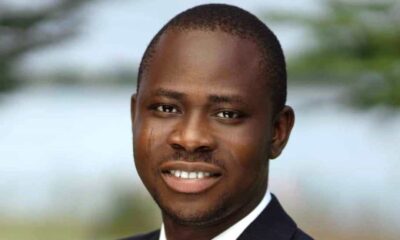GRTech
AfreximBank Boss, ECOWAS, Diplomats and others to Speak at GAIN Youth Summit 2022


The President and Chairman of the Board of Directors of African Export Import Bank (AfreximBank) Professor Benedict O. Oramah; High Commissioner of Namibia to Nigeria, H.E Humphrey Geiseb; Ambassador of Cote D’Ivoire to Nigeria and ECOWAS, H.E Ambassador Kalilou TRAORE; Dr Tony Luka Elumelu, Ag. Director of Private Sector Development at the ECOWAS Commission, Nigeria as well as popular Nigerian business man, Mr Obinna Tochukwu Iyiegbu (Obi Cubana), Chairman, Cubana Group, Nigeria have been named the Keynote and Guest Speakers respectively at the 2022 edition of the Grand Africa Initiative – GAIN Youth Summit holding from 28th-29th October, 2022 at 10am WAT daily with the theme The Africa We Want: Nexus between the Youth, Peace and Entrepreneurship II.
The GAIN Youth Summit is an annual gathering of policy makers, diplomats, public and private sector leaders, development institutions, civil society groups and the youths from across the continent and the diaspora, focused on developing entrepreneurship, innovation, professional and employability capacities in young Africans in a way that helps tackle the menace of youth unemployment and conflict on the continent.
The Executive Director, Grand Africa Initiative (GAIN), Ms. Chinwe Okoli stated that this year’s summit will build on and further examine the key insights around the theme The Africa We Want: Nexus between the Youth, Peace and Entrepreneurship discussed at the 2021 summit which had the Vice President of the Federal Republic of Nigeria, professor Yemi Osinbajo, SAN as the Special Guest of Honour.
According to Ms. Okoli, “We are excited at the level of growth in impact that the GAIN Youth Summit is making through the years. This year, we are glad that organisations and institutions such as ECOWAS Commission, AfreximBank, Embassy of the Republic of Guinea to Nigeria, High Commission of Namibia to Nigeria and Embassy of Cote D’Ivoire to Nigeria are partnering with GAIN. We are especially grateful to ECOWAS through the Youth and Sports Development Centre(EYSDC) for their financial support. We are also grateful to all those who will be sharing their thoughts with over 2000 youths from across the world”.
According to Ms Okoli, “other confirmed speakers include; Ehia Erhaboh, Executive Vice President, Operations and Technology, Interswitch Group, Nigeria; Caroline Njuki, Officer in Charge and Chief Technical Advisor Inclusive Jobs and Education, International Labour Organisation, Kenya; Eric Nges: Vice President, J.P Morgan, Germany; Hon. Emma Inamutila Theofelus(MP); Deputy Minister for ICT, Namibia; Sam Itodo, Executive Director, YIAGA Africa, Nigeria; Emmanuel Asika; Country Manager- HP Nigeria; Omni Channel Manager-HP ACE; Lennox Omondi, CEO and Founder, Eco-Bana Limited, Kenya and 2022 Winner Hult Prize; Chidi Nwaogu, Co-Founder, Publiseer/ Tech Entrepreneur and Software Developer, Nigeria; Princess Adeyinka Tenekah; Founder/CEO, Happy Coffee, Nigeria; Rapitso Mosebetsi, Co-Founder & CEO Iconics Pty Ltd, Lesotho… among others”
Over the past three years, the GAIN Youth Summit has deepened the discourse and contributed to shaping policies around strategies to unleash the economic potentials of young Africans to build sustainable prosperity on the continent. We are delighted that previous editions of the summit attracted high profile leaders such as Professor Chukwuma Charles Soludo, Governor, Anambra State and former Governor of Central Bank of Nigeria; British High Commissioner to Nigeria, Catriona Laing; Ambassador of Angola to Nigeria, Dr Januario Eustaquio Quibato; The High Commissioner of South Africa to Nigeria, Mr Thami Mseleku; Nigeria’s Minister of Youth and sports, Hon Sunday Dare; Her Excellency, Mrs Teneng Mba Jaiteh, The Ambassador Plenipotentiary of The Gambia to Kingdom of Belgium and the European Union; H.E S. F Houmard, The President of in Global Office of the Global Union; H.E, Mr Georges R. P. Chikoti, The Secretary General of the Organisation of African, Caribbean and Pacific States (OACPS); Mr Tomi Davies ‘TD’, Collaborator-in-Chief, TVC Labs/President, African Business Angel Network (ABAN), Mr Modise J.Motloba, The Group CEO, Tysys Capital Group, South Africa; Professor Joseph Nnanna, Chief Economist, development bank of Nigeria; Professor Ndubuisi Ekekwe,Lead Faculty, Tekedia Institute; Mrs Fati N’zi-Hassane, Supervisor, Human Capital Division AUDA-NEPAD, African Union among others
Grand Africa Initiative (GAIN) is a youth-focused pan-African non-governmental organization which comprises young Africans between 15 and 35 years drawn from within and outside the continent, who are passionate about promoting entrepreneurship as a means to reduce conflict, promote peace and economic revival of the continent. GAIN programs include training, advocacy, mentorship, and youth events, designed to help achieve sustainable development by igniting the positive energy of the greater segment of Africa’s population – the youth.
Participation:
Register to attend the summit for free via the link: http://bit.ly/GAINYS22











